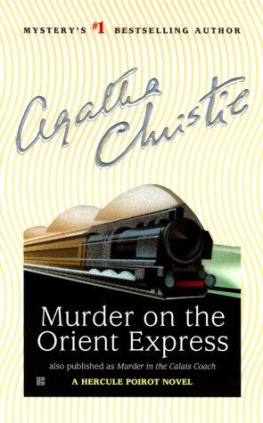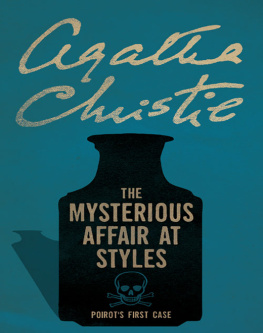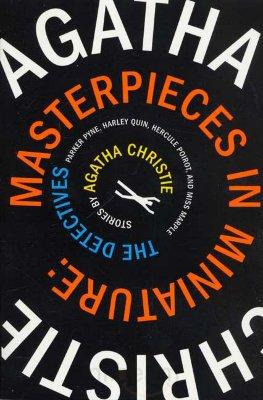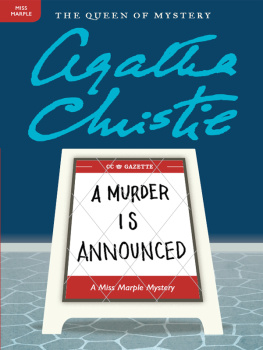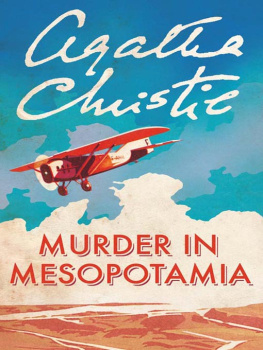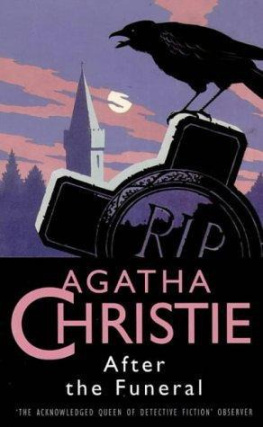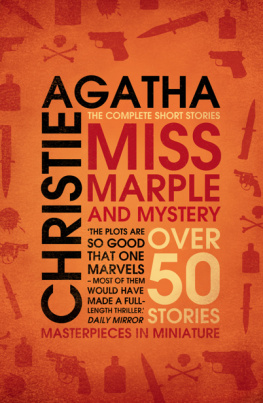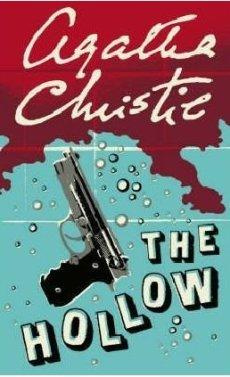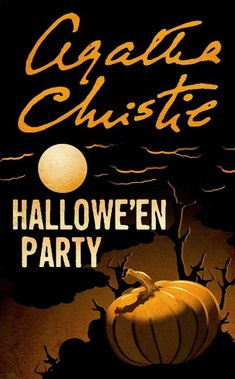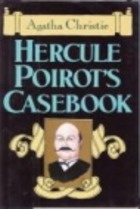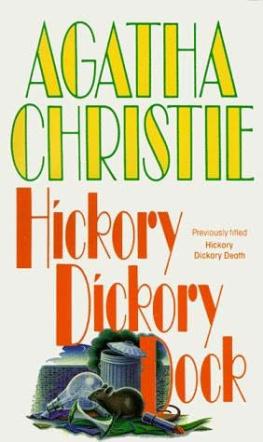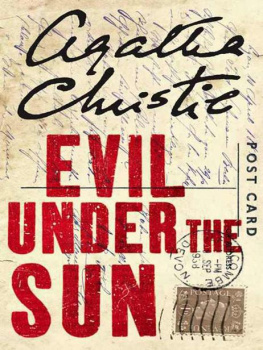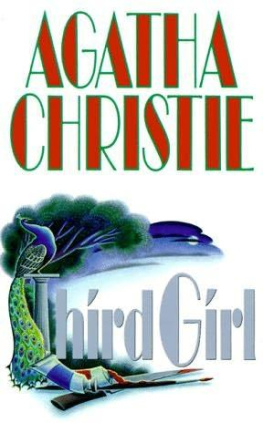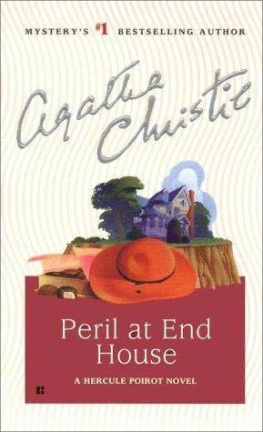Agatha Christie - Murder on the Orient Express: A Hercule Poirot Mystery
Here you can read online Agatha Christie - Murder on the Orient Express: A Hercule Poirot Mystery full text of the book (entire story) in english for free. Download pdf and epub, get meaning, cover and reviews about this ebook. year: 1934, genre: Detective and thriller. Description of the work, (preface) as well as reviews are available. Best literature library LitArk.com created for fans of good reading and offers a wide selection of genres:
Romance novel
Science fiction
Adventure
Detective
Science
History
Home and family
Prose
Art
Politics
Computer
Non-fiction
Religion
Business
Children
Humor
Choose a favorite category and find really read worthwhile books. Enjoy immersion in the world of imagination, feel the emotions of the characters or learn something new for yourself, make an fascinating discovery.
- Book:Murder on the Orient Express: A Hercule Poirot Mystery
- Author:
- Genre:
- Year:1934
- Rating:3 / 5
- Favourites:Add to favourites
- Your mark:
- 60
- 1
- 2
- 3
- 4
- 5
Murder on the Orient Express: A Hercule Poirot Mystery: summary, description and annotation
We offer to read an annotation, description, summary or preface (depends on what the author of the book "Murder on the Orient Express: A Hercule Poirot Mystery" wrote himself). If you haven't found the necessary information about the book — write in the comments, we will try to find it.
Murder on the Orient Express: A Hercule Poirot Mystery — read online for free the complete book (whole text) full work
Below is the text of the book, divided by pages. System saving the place of the last page read, allows you to conveniently read the book "Murder on the Orient Express: A Hercule Poirot Mystery" online for free, without having to search again every time where you left off. Put a bookmark, and you can go to the page where you finished reading at any time.
Font size:
Interval:
Bookmark:
THE ARMSTRONG KIDNAPPING CASE
They found M. Bouc finishing an omelet.
I thought it best to have lunch served immediately in the restaurant car, he said. Afterwards it will be cleared and M. Poirot can conduct his examination of the passengers there. In the meantime I have ordered them to bring us three some food here.
An excellent idea, said Poirot.
None of the three men was hungry, and the meal was soon eaten; but not till they were sipping their coffee did M. Bouc mention the subject that was occupying all their minds.
Eh bien? he asked.
Eh bien, I have discovered the identity of the victim. I know why it was imperative he should leave America.
Who was he?
Do you remember reading of the Armstrong baby? This is the man who murdered little Daisy Armstrong. Cassetti.
I recall it now. A shocking affair-though I cannot remember the details.
Colonel Armstrong was an Englishman-a V.C. He was half American, his mother having been a daughter of W. K. Van der Halt, the Wall Street millionaire. He married the daughter of Linda Arden, the most famous tragic American actress of her day. They lived in America and had one child-a girl whom they idolized. When she was three years old she was kidnapped, and an impossibly high sum demanded as the price of her return. I will not weary you with all the intricacies that followed. I will come to the moment when, after the parents had paid over the enormous sum of two hundred thousand dollars, the childs dead body was discovered; it had been dead for at least a fortnight. Public indignation rose to fever point. And there was worse to follow. Mrs. Armstrong was expecting another baby. Following the shock of the discovery, she gave birth prematurely to a dead child, and herself died. Her broken-hearted husband shot himself.
Mon Dieu, what a tragedy. I remember now, said M. Bouc. There was also another death, if I remember rightly?
Yes, an unfortunate French or Swiss nursemaid. The police were convinced that she had some knowledge of the crime. They refused to believe her hysterical denials. Finally, in a fit of despair the poor girl threw herself from a window and was killed. It was proved afterwards that she had been absolutely innocent of any complicity in the crime.
It is not good to think of, said M. Bouc.
About six months later, this man Cassetti was arrested as the head of the gang who had kidnapped the child. They had used the same methods in the past. If the police seemed likely to get on their trail, they killed their prisoner, hid the body, and continued to extract as much money as possible before the crime was discovered.
Now, I will make clear to you this, my friend. Cassetti was the man! But by means of the enormous wealth he had piled up, and owing to the secret hold he had over various persons, he was acquitted on some technical inaccuracy. Notwithstanding that, he would have been lynched by the populace had he not been clever enough to give them the slip. It is now clear to me what happened. He changed his name and left America. Since then he has been a gentleman of leisure, travelling abroad and living on hisrentes .
Ah! quel animal! M. Boucs tone was redolent of heartfelt disgust. I cannot regret that he is dead-not at all!
I agree with you.
Tout de mme, it is not necessary that he should be killed on the Orient Express. There are other places.
Poirot smiled a little. He realised that M. Bouc was biased in the matter.
The question we have now to ask ourselves is this, he said. Is this murder the work of some rival gang whom Cassetti had double-crossed in the past, or is it an act of private vengeance?
He explained his discovery of the few words on the charred fragment of paper.
If I am right in my assumption, then, the letter was burnt by the murderer. Why? Because it mentioned the name Armstrong, which is the clue to the mystery.
Are there any members of the Armstrong family living?
That, unfortunately, I do not know. I think I remember reading of a younger sister of Mrs. Armstrongs.
Poirot went on to relate the joint conclusions of himself and Dr. Constantine. M. Bouc brightened at the mention of the broken watch.
That seems to give us the time of the crime very exactly.
Yes, said Poirot. It is very convenient.
There was an indescribable something in his tone that made both the other two look at him curiously.
You say that you yourself heard Ratchett speak to the conductor at twenty minutes to one? asked M. Bouc.
Poirot related just what had occurred.
Well, said M. Bouc, that proves at least that Cassetti-or Ratchett, as I shall continue to call him-was certainly alive at twenty minutes to one.
Twenty-three minutes to one, to be precise.
Then at twelve thirty-seven, to put it formally, Mr. Ratchett was alive. That isone fact, at least.
Poirot did not reply. He sat looking thoughtfully in front of him.
There was a tap on the door and the restaurant attendant entered.
The restaurant car is free now, Monsieur, he said.
We will go there, said M. Bouc, rising.
I may accompany you? asked Constantine.
Certainly, my dear doctor. Unless M. Poirot has any objection?
Not at all. Not at all, said Poirot.
After a little politeness in the matter of precedence-Aprs vous, Monsieur-Mais non, aprs vous-they left the compartment.
THE EVIDENCE
THE EVIDENCE OF THE WAGON LIT CONDUCTOR
In the restaurant car all was in readiness.
Poirot and M. Bouc sat together on one side of a table. The doctor sat across the aisle.
On the table in front of Poirot was a plan of the Istanbul-Calais coach with the names of the passengers marked in red ink. The passports and tickets were in a pile at one side. There was writing paper, ink, pen, and pencils.
Excellent, said Poirot. We can open our Court of Inquiry without more ado. First, I think, we should take the evidence of the Wagon Lit conductor. You probably know something about the man. What character has he? Is he a man on whose word you would place reliance?
I should say so, most assuredly. Pierre Michel has been employed by the company for over fifteen years. He is a Frenchman-lives near Calais. Thoroughly respectable and honest. Not, perhaps, remarkable for brains.
Poirot nodded comprehendingly. Good, he said. Let us see him.
Pierre Michel had recovered some of his assurance, but he was still extremely nervous.
I hope Monsieur will not think that there has been any negligence on my part, he said anxiously, his eyes going from Poirot to M. Bouc. It is a terrible thing that has happened. I hope Monsieur does not think that it reflects on me in any way?
Having soothed the mans fears, Poirot began his questions. He first elicited Michels name and address, his length of service, and the length of time he had been on this particular route. These particulars he already knew, but the routine questions served to put the man at his ease.
And now, went on Poirot, let us come to the events of Last night. M. Ratchett retired to bed-when?
Almost immediately after dinner, Monsieur. Actually before we leftBelgrade . So he did on the previous night. He had directed me to make up the bed while he was at dinner, and I did so.
Did anybody go into his compartment afterwards?
His valet, Monsieur, and the young American gentleman, his secretary.
Anyone else?
No, Monsieur, not that I know of.
Good. And that is the last you saw or heard of him?
No, Monsieur. You forget he rang his bell about twenty to one-soon after we had stopped.
Font size:
Interval:
Bookmark:
Similar books «Murder on the Orient Express: A Hercule Poirot Mystery»
Look at similar books to Murder on the Orient Express: A Hercule Poirot Mystery. We have selected literature similar in name and meaning in the hope of providing readers with more options to find new, interesting, not yet read works.
Discussion, reviews of the book Murder on the Orient Express: A Hercule Poirot Mystery and just readers' own opinions. Leave your comments, write what you think about the work, its meaning or the main characters. Specify what exactly you liked and what you didn't like, and why you think so.

